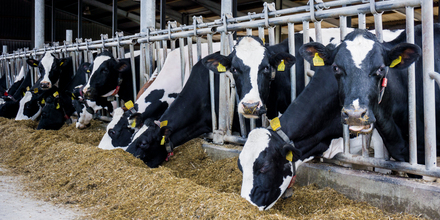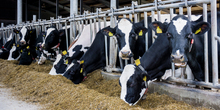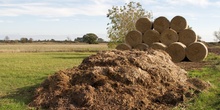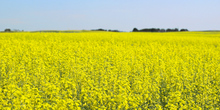Agriculture & Land Management
Our Work
Latest in Agriculture & Land Management
-

What contributions can agricultural emissions make to the proposed Effort Sharing Regulation?
New IEEP report finds the agriculture sector can significantly contribute to the EU’s climate commitments by reducing its non-CO2 emissions. It also finds these contributions can be delivered cost efficiently with environmental co-benefits without impacting production.
-
Towards sustainability: Future policies for European livestock
The CAP is failing to reward adequately those livestock farmers who produce public goods. Brexit and CAP reform are opportunities to do better.
-
Are Ecological Focus Areas delivering for biodiversity?
Ecological Focus Areas are intended to safeguard and improve biodiversity on arable farms in the EU. What evidence is there that they are actually delivering biodiversity on farmland?
-
Ecological Focus Areas – what are their impacts on biodiversity?
Ecological Focus Areas are intended to safeguard and improve biodiversity on arable farms in the EU. This IEEP study for EEB and BirdLife examined the evidence for potential biodiversity impacts on farmland, taking into account how the areas are being managed.
-
IEEP sets out new sustainability criteria for biofuels post 2020
Defining effective and workable sustainability criteria for biofuels is one of the critical steps in decarbonising Europe’s energy sector. Such criteria must provide the necessary safeguards for the use of bioresources in Europe, as well as the policy and investment certainty required for sustainable deployment.
-
Sustainability criteria for biofuels post 2020
Defining effective and workable sustainability criteria is one of the critical steps in decarbonising Europe’s energy sector. They must provide the necessary safeguards for the use of bioresources in Europe, as well as the policy and investment certainty required for sustainable deployment.
-
New PEGASUS website
Project website for EU research project PEGASUS goes live!
-
Looking beyond Paris
The latest edition of IEEP's newsletter is now available. David Baldock argues that in the next six months the EU has a substantive role in contributing to agreement on an ambitious but credible set of SDGs and more stretching climate targets. Also: energy efficiency and security; bioeconomy; and circular economy.
-
EU research project PEGASUS - new thinking on sustainable land management
EU research project PEGASUS kicked off in London on 29-30 April. The three-year project, led by IEEP, is focused on transforming land management approaches in the EU to improve the delivery of public goods and ecosystem services from rural areas.
-
Evidence before ideology
The latest edition of IEEP's newsletter is now available. David Baldock argues that in 2015 solid evidence rather than political fashion will be required in scrutinising EU policy and economic performance. Also: fossil fuel subsidies; allocating fishing quota; and the launch of our new training programme.
-
The Manual: Chapter 13 - Sectoral policies
This is a chapter of IEEP’s Manual of European Environmental Policy. This chapter sets out the development of some of the most important links between EU environmental policy and other policy areas, such as agriculture, forestry, fisheries, transport, trade, and so on.
-
Sustainable intensification of European agriculture
The concept of sustainable intensification has come into prominence in the context of global food security. This report defines what we mean by sustainable intensification, explains its global logic, discusses what it means for EU agriculture and exemplifies this in three case studies for soil performance, nutrient recycling and biodiversity.
-
Space for energy crops – An assessment on the potential contribution of Europe’s energy future
The overall energy potential that can be produced from growing dedicated energy crops on ‘spare’ land in the EU is low. This new report explores the potential for the additional production of energy crops in Europe on land not already used for food production, forestry, or providing other important services, and assesses some of the challenges associated with increasing output.
-
High Nature Value farming throughout EU-27 and its financial support under the CAP
This study reviews Member States’ estimates of the extent of HNV farmland and use of RDP measures and the CMEF indicators, then identifies future priorities for CAP support for HNV farming and discusses the support opportunities under the reformed CAP. It offers detailed new evidence about the combined effect of Pillar 1 and Pillar 2 CAP payments on the economic and environmental viability of a typical HNV farming system in three Member States.
-
New report: High Nature Value Farming in the EU
Member States need to make the most of the opportunities under the new Common Agricultural Policy if the declines in HNV farming, critical for meeting our 2020 biodiversity targets, are to be halted.
-
Press release - Biofuels don’t deliver but bioresources have promise
Biofuels produced from conventional agricultural crops deliver only limited reductions in greenhouse gas emissions (GHG) and compete for limited supplies of land.
-
Re-examining EU biofuels policy: A 2030 perspective
EU biofuel policy must reflect the reality that while biomass in principle can be renewed, the overall quantity sustainably available is finite and must be shared across an emerging bioeconomy.
-
Options for sustainable food and agriculture in the EU
How should Europe respond to the increased demands on our food and agriculture systems arising from global population growth, changing diets, and competing demands on agricultural land? This report offers a view on how the EU could play a role in meeting these challenges in the coming decades and sets out some of the options which merit particular attention.
-
Europe’s role in feeding the world in 2050
IEEP presents views on how Europe should respond to the increased demands on our food and agriculture systems arising from global population growth, changing diets, and competing demands on agricultural land.
-
Interactions between climate change and agriculture; and between biodiversity and agriculture in Europe
What should be Europe’s role in feeding the world in 2050? This IEEP report for the European Parliament describes options for increasing the productivity of European agriculture whilst adapting to climate change, reducing emissions, and providing biodiversity and ecosystem service benefits from agriculture.
Related
-

Debating the Future of The Common Agricultural Policy
The IEEP's platform to share thoughtful commentary and analysis on the future development of European agriculture and rural development policy.
Highlights
-

What contributions can agricultural emissions make to the proposed Effort Sharing Regulation?
New IEEP report finds the agriculture sector can significantly contribute to the EU’s climate commitments by reducing its non-CO2 emissions. It also finds these contributions can be delivered cost efficiently with environmental co-benefits without impacting production.
-

Ecological Focus Areas – what are their impacts on biodiversity?
Ecological Focus Areas are intended to safeguard and improve biodiversity on arable farms in the EU. This IEEP study for EEB and BirdLife examined the evidence for potential biodiversity impacts on farmland, taking into account how the areas are being managed.
-

Sustainability criteria for biofuels post 2020
-

Re-examining EU biofuels policy: A 2030 perspective
-

The Indirect Land Use Change Impact of the Use of Biofuels in the EU
-
The Land-Use Implications of EU Bioenergy Policy: Going Beyond ILUC
